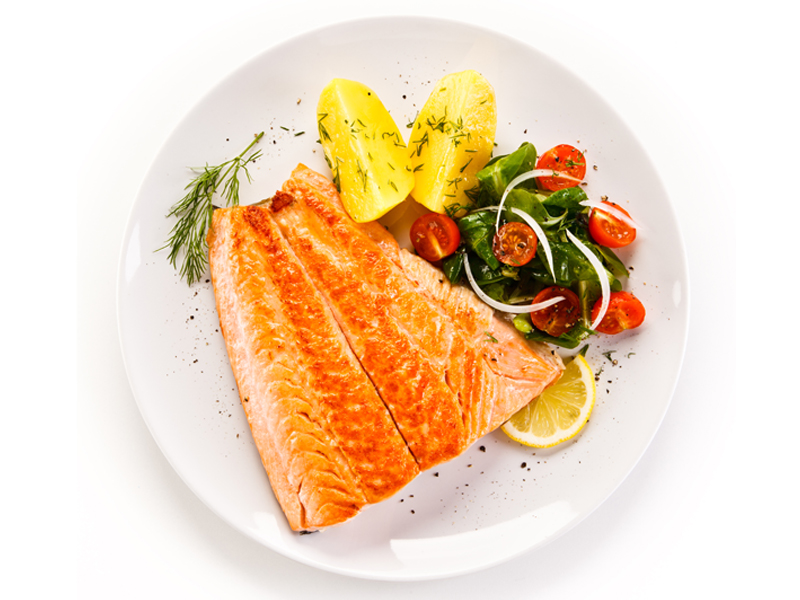Get Easy Health Digest™ in your inbox and don’t miss a thing when you subscribe today. Plus, get the free bonus report, Mother Nature’s Tips, Tricks and Remedies for Cholesterol, Blood Pressure & Blood Sugar as my way of saying welcome to the community!
The 3 biggest dangers of eating farm-raised fish

The other day, I was making my weekly grocery run. (Okay, let’s get honest… I was in the grocery store for the fourth time that week because once again, I had forgotten to get everything on my list – you know how it goes.)
Since I needed something relatively quick to make for dinner, I decided to run by the seafood counter and grab some salmon.
My husband and I love it and I have a recipe that takes less than 30 minutes to put together, veggies and all, so it’s a last minute stand-by in my house.
So, I started scoping out the seafood area. Yep, there was the salmon and it looked beautiful.
But, here’s the kicker…
The tag said “Atlantic Salmon,” and while you may not know it, most, if not all, salmon from the Atlantic is now farm-raised and for me, that’s a hard pass.
Why?
Because of the three biggest dangers that come from eating farm-raised fish…
Farm-raised fish danger #1 – Dirty dioxin
One of the biggest risks you take when you take a bite of that farm-raised fish for dinner is that you’re taking a big bite of dioxin. You see, scientists have found that dioxin levels in farm-raised fish are 11 times higher than those of wild-caught fish.
Why is this a problem?
Well, if you’ve never heard of dioxin before, you should know that it’s one of the “Dirty Dozen” – a group of chemical that are actually stored in your fat cells and are linked to immune system problems, organ damage and even cancer.
Farm-raised fish danger #2 – Diabetes anyone?
And, if risking cancer, organ damage and constant illness due to a weak immune system isn’t enough for you, how about taking a chance of getting diabetes too?
Yep, that’s right…
Eating farm-raised fish could also lead to diabetes.
You see, a scientific study proved that mice that ate farm-raised salmon actually developed metabolic syndrome as well as the symptoms of type 2 diabetes.
Scary, right?
According to the researchers, the reason the farm-raised fish can lead to metabolic syndrome and blood sugar problems is because they are contaminated with persistent organic pollutants or POPs which cause insulin resistance and obesity – not exactly the healthy effects you were looking for from eating fish.
Farm-raised fish danger #3 – Fake colors
And, the danger doesn’t end there…
You know that beautiful pink color salmon has?
Well, only wild-caught salmon actually has it – they have to fake it when it comes to the farm-raised variety.
And, the chemical they used to do it – called canthaxanthin – can actually cause problems with the pigments in the retina of your eye.
In fact, it’s such a worry that it’s been banned in the UK, EU and Australia.
I don’t know about you, but if it’s so dangerous to my vision that it’s been banned across multiple countries, I definitely don’t want to eat it in my fish!
Unfortunately, salmon are not the only farm-raised fish you’ll find at the supermarket. Watch out for catfish, cod (most often what you will find in fish sticks) and tilapia as well. And when buying salmon, look for wild-caught Alaskan salmon.
With all of those dangers in mind, remember that when it comes to fish, wild-caught is the only way to go.
Editor’s note: Have you heard of EDTA chelation therapy? It was developed originally to remove lead and other contaminants, including heavy metals, from the body. Its uses now run the gamut from varicose veins to circulation. Click here to discover Chelation: Natural Miracle for Protecting Your Heart and Enhancing Your Health!
Sources:
- Atlantic Salmon — NOAA Fisheries | Greater Atlantic Region
- Global assessment of organic contaminants in farmed salmon — Science
- Dioxins and their effects on human health — World Health Organization
- Chronic consumption of farmed salmon containing persistent organic pollutants causes insulin resistance and obesity in mice — PLoS One
- Interactions Between Canthaxanthin And Lipid Membranes – Possible Mechanisms Of Canthaxanthin Toxicity — Cellular & Molecular Biology Letters
- Canthaxanthine-induced retinal pigment epithelial changes in the cat — Current Eye Research
- 16 People Talk About Banned And Illegal Foods From Around The World — The Thought & Expression Company, LLC.
- Comparison of food colour regulations in the EU and the US: a review of current provisions — Food Additives & Contaminants: Part A













